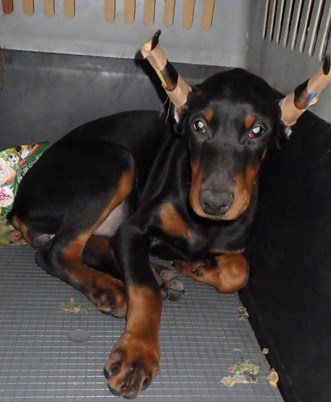Standing up for the veterinary profession
08 Aug 2024
19 Jan 2021 | Robin Hargreaves
Small animal vet and BVA past president Robin Hargreaves raises alarm over a recent surge in ear cropping cases he has been seeing in practice

I have been in general practice seeing first opinion cases in the community for 35 years. Until a very few years ago, I had never seen a dog with cropped ears with the exception of photographs or foreign films.
Ear cropping is when the ear lobes of a dog are cut off in part or whole, usually without any anaesthesia or pain relief, for purely cosmetic reasons. The procedure usually takes place when puppies are two or three months old, and the trauma of the procedure can have a significant psychological impact on the maturing dog.
It was well known to be an illegal mutilation in the UK, and till recently, the importation of dogs with cropped ears was pretty rare and limited largely to repatriations.
Maybe three or four years ago, I began to see the odd dog with cropped ears that originated overseas. I usually expressed surprise and some disapproval, but it clearly wasn’t a prime motivator for the owner in acquiring that animal. The significance of the procedure was usually poorly understood and it was simply something that had happened before the pet was acquired.
Importation of pets became commonplace, a combination of the popularity of rescuing stray and distressed animals and the availability of puppies abroad to meet a national demand that outstripped availability or the desire for instant gratification.
It also seems that in the arms race that is fashion, dogs have moved from being something you might acquire with a certain appearance to make a statement about yourself, to something you might surgically disfigure to enhance your image and status within a peer group.
 In a very short period of time, my practice began to see young animals with cropped ears. Their owners usually said they had acquired the dogs abroad, but significantly we suspect they had done so purely to circumvent the law that prevents ear cropping at home.
In a very short period of time, my practice began to see young animals with cropped ears. Their owners usually said they had acquired the dogs abroad, but significantly we suspect they had done so purely to circumvent the law that prevents ear cropping at home.
More alarmingly, microchip information has confirmed to us that at least one puppy we have seen was cropped in the UK as it was chipped here at eight weeks old and had been cropped when presented for first vaccination.
It is clear to me that anyone performing this illegal and completely pointless painful procedure, quite likely without the benefits of appropriate anaesthesia or pain relief, would tell an owner to claim that the animal was sourced legally abroad. We have had a number of examples of this, but the most superficial questioning usually illustrates that either that was not the case or at best it was an illegal importation, either smuggled or abusing the pet travel scheme.
Unfortunately, it’s likely that some owners are willing to travel with their dogs to countries where someone is prepared to mutilate their pet for a price and it might be entirely legal there.
It is critical that this activity is brought to the attention of the relevant authorities. Those involved here must be prosecuted and importation must be scrutinised and discouraged. Anyone claiming to be an animal lover should be exposed and shunned If they are propagating this cruel, unnecessary mutilation in the name of vanity.
If you’re a veterinary professional and you’re concerned about cases of ear cropping or illegal importation that you’ve seen in practice, you can report these concerns to your local authority animal health and welfare team.
With thanks to RSPCA for images.
Get tailored news in your inbox and online, plus access to our journals, resources and support services, join the BVA.
Join Us Today